九年级英语1-5单元复习要点
2019人教版九年级英语期中综合复习1-5单元短语归纳总结

人教版九年级英语期中综合复习1-5单元短语归纳总结Unit1 短语归纳1.by working with friends 通过和朋友一起学习2.by making word cards 通过制作单词卡片3.by reading the textbook 通过阅读书籍4.by listening to tapes 通过听录音带5.by asking the teacher for help 通过向老师寻求帮助6.by working with a group通过和小组一起学习7.study for a test 为一场考试学习8.have conversations with friends in English 和朋友用英语交流9.read aloud 读得很大声10.practice pronunciation 练习发音11.learn a lot 学到了很多12.improve my speaking skills 提高我的口语技巧13.understand spoken English 理解口语14.a little nervous 有一点紧张15.finish reading a book 完成阅读一本书16.next Monday 下周一17.a very slow reader 一个很慢的阅读者18.read quickly 很快地阅读19.get the main ideas 理解主要意思20.at first 首先21.read word by word 一个单词一个单词地读e a dictionary 使用一本字典23.try to guess a word’s meaning 尽力去猜测一个单词的意思24.by reading the sentences 通过阅读句子25.sound difficult 听起来很困难26.be patient 耐心的27.take time 花费时间28.the more…, the faster… 越多……,越快……29.the secret to language learning 语言学习的秘密30.a bad dream 噩梦31.speak so quickly 讲得很快32.be afraid to ask questions 很害怕去问问题33.because of 因为34.the poor pronunciation 差的发音35.hide behind my textbook 躲在我的课本后面36.never say anything 绝不说任何事37.fall in love with 爱上38.this exciting and funny movies 这些精彩有趣的电影39.their body language and the expressions on their faces 他们的身体语言和脸上的表情40.help me to get the meaning 帮助我理解意思41.listen to something interesting 听一些有趣的东西42.learn useful sentences 学习有用的句子43.I t’s a piece of cake. 小菜一碟。
九年级英语1-5单元知识点

九年级英语1-5单元复习点Unit 1 复习要点一、短语。
1. by making flashcards 通过做单词抽认卡2. ask…for help 向某人求助3. read aloud 朗读4. that way (=in that way) 通过那种方式5. improve my speaking skills 提高我的会话技巧6. for example 例如7. have fun doing sth 玩得高兴8. have conversations with friends 与朋友对话9. get excited about 为…高兴,激动10.end up speaking in Chinese 以说汉语结束对话11.do a survey about…做有关…的调查12.keep an English notebook 记英语笔记13.spoken English (= oral English) 英语口语14.make mistakes in sth 在…犯错误15.get the pronunciation right 使发音准确16.practise speaking English 练习说英语17.first of all 首先18.begin with以…开始ter on随后20.in class 在课堂上ugh at 嘲笑22.take notes 记笔记23.enjoy doing 喜欢干…24.write down 写下,记下25.look up (v + adv) 查找,查询26.native speakers 说本族话的人27.make up 编造,虚构,化妆,打扮28.around the world 全世界29.deal with 对待,处理,解决30.worry about (be worried about) 担心,担忧31.be angry with生某人的气32.stay angry 生气33.go by 消逝34. regard…as…把…当做…plain about/of 抱怨36. with the help of 在…的帮助下pare…to (with)…把…和…作比较38.think of (think about) 想起,想到39.physical problems 身体上的问题40.break off 中断,突然终止41.not…at all 根本不,全然不42.make complete sentences 做完整的句子43.join 加入某团体并成为其中一员;join in与take part in指参加到某项活动中去。
人教版英语九年级1—5单元重点短语及用法
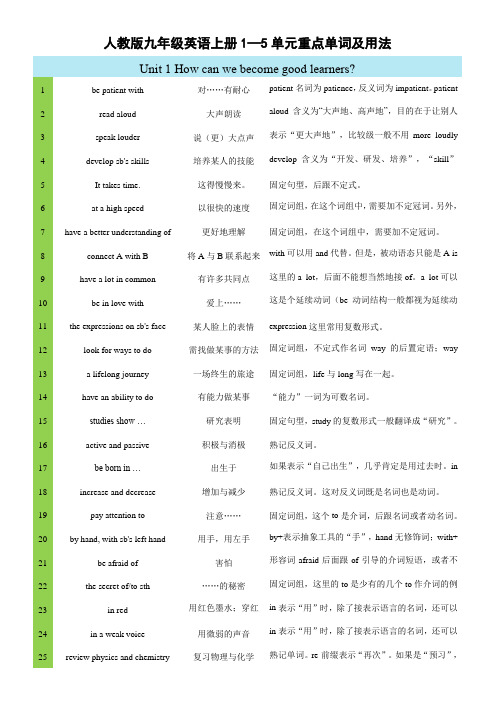
人教版九年级英语上册1—5单元重点单词及用法Unit 1 How can we become good learners?1 be patient with 对……有耐心patient名词为patience,反义词为impatient。
patient2 read aloud 大声朗读aloud含义为“大声地、高声地”,目的在于让别人3 speak louder 说(更)大点声表示“更大声地”,比较级一般不用more loudly4 develop sb's skills 培养某人的技能develop含义为“开发、研发、培养”,“skill”5 It takes time. 这得慢慢来。
固定句型,后跟不定式。
6 at a high speed 以很快的速度固定词组,在这个词组中,需要加不定冠词。
另外,7 have a better understanding of 更好地理解固定词组,在这个词组中,需要加不定冠词。
8 connect A with B 将A与B联系起来with可以用and代替。
但是,被动语态只能是A isconnected with B9 have a lot in common 有许多共同点这里的a lot,后面不能想当然地接of。
a lot可以something nothing10 be in love with 爱上……这是个延续动词(be动词结构一般都视为延续动fall in love with11 the expressions on sb's face 某人脸上的表情expression这里常用复数形式。
12 look for ways to do 需找做某事的方法固定词组,不定式作名词way的后置定语;way13 a lifelong journey 一场终生的旅途固定词组,life与long写在一起。
14 have an ability to do 有能力做某事“能力”一词为可数名词。
人教版九年级一本全英语1-5单元知识点(复习)资料讲解

Unit 1通过向老师求助the teacher help. 要求某人做某事ask sb. (do)sth. 2和朋友用英语交谈She can sing,and she can dance,(也),She can sing,and she can (也)dance.He didn know the answer.I didn't know,(也)14 I (发现)that(听有趣的事情)25connect -- (n.)26不断练习他们所学到的keep what they have learned28寻找方法来复习ways29wisely —(adj.明智的)conversations friends (be)the secret language learning. 30 自己your ownEnglish.3 What about (大声朗读)?15 in a dictionary(.查阅它们)在字典里31 用:see our eyes and hear our ears.sing English4 英语口语English 16 (为了+从句)improve my English reading a lot. 一个讲英语的国家an (为了+动词原型)country5读完一本书finish (read)a book6对某人有耐心be sb.7有耐心的(adj.)—耐心地(adv.)—耐心(n.)8(越多)you read,you'll be.9发现学英语很难find difficult English.10I was (害怕去问)questions(因为)my poor pronunciation. 17通过记笔记、做练习和大量阅读。
By ,doing andreading .18physics—(n.物理学的,身体的)19increase 增长了increase 增长到20——我没有一起练习英语的伙伴。
九年级英语Unit1-Unit5单元讲解
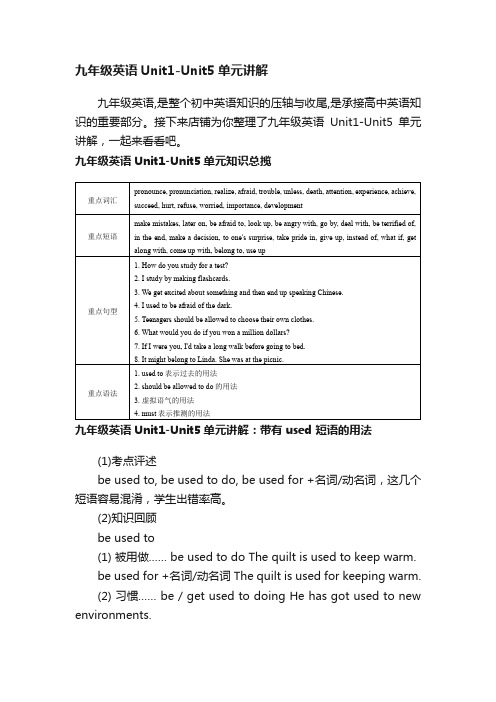
九年级英语Unit1-Unit5单元讲解九年级英语,是整个初中英语知识的压轴与收尾,是承接高中英语知识的重要部分。
接下来店铺为你整理了九年级英语Unit1-Unit5单元讲解,一起来看看吧。
九年级英语Unit1-Unit5单元知识总揽(1)考点评述be used to, be used to do, be used for +名词/动名词,这几个短语容易混淆,学生出错率高。
(2)知识回顾be used to(1) 被用做…… be used to do The quilt is used to keep warm.be used for +名词/动名词 The quilt is used for keeping warm.(2) 习惯…… be / get used to doing He has got used to new environments.(3) 过去常做 used to do (did something very often in the past)He used to go there. But now, he seldom go there.(3)考题赏析例1 (2008·黑龙江哈尔滨)While traveling to Canada, you should give yourself a day to the time and know the way nearby.A. used toB. be used toC. use to解析:本题主要考查了be used to的用法:习惯什么事情。
答案:B.点评:对于此类问题的解决需要学生易混点进行准确的记忆。
九年级英语Unit1-Unit5单元讲解:带有否定词的反义疑问句(1)考点评述反义疑问句,即附加疑问句。
它表示提问人的看法没有把握,需要对方证实。
反义疑问句由两部分组成:前一部分是一个陈述句,后一部分是一个简短的疑问句,两部分的人称时态应保持一致。
新目标人教版九年级英语上册Unit1全单元知识点归纳
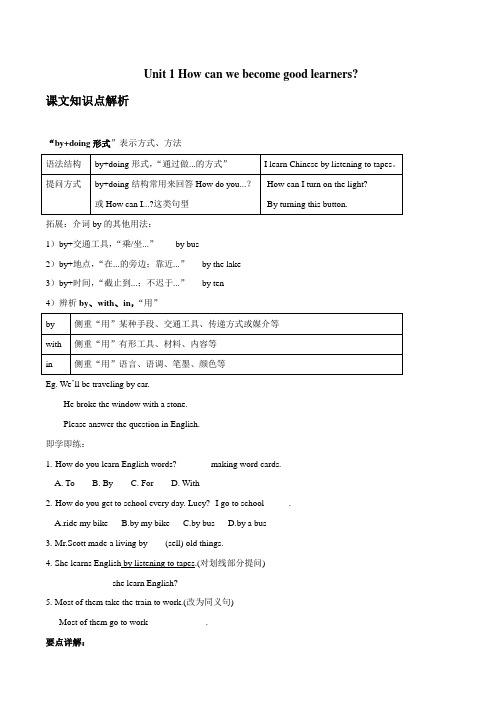
Unit 1 How can we become good learners?课文知识点解析“by+doing 形式”表示方式、方法拓展:介词by 的其他用法:1)by+交通工具,“乘/坐...” by bus2)by+地点,“在...的旁边;靠近...” by the lake3)by+时间,“截止到...;不迟于...” by ten4)辨析by 、with 、in ,“用”Eg. We ’ll be traveling by car.He broke the window with a stone.Please answer the question in English.即学即练:1.-How do you learn English words? -_____making word cards.A. ToB. ByC. ForD. With2.-How do you get to school every day. Lucy? -I go to school _____.A.ride my bikeB.by my bikeC.by busD.by a bus3. Mr.Scott made a living by____(sell) old things.4. She learns English by listening to tapes.(对划线部分提问)_____ ______ she learn English?5. Most of them take the train to work.(改为同义句)Most of them go to work ______ ______.要点详解:Section A1.by asking the teacher for help通过向老师求助。
(P1)1)by,“通过;靠”,后加名词/代词/动名词。
Eg. He had to do all the work by hand.2)ask (sb)for sth,“向某人要某物;要求某人某事”。
九年级英语1-6单元重点单词
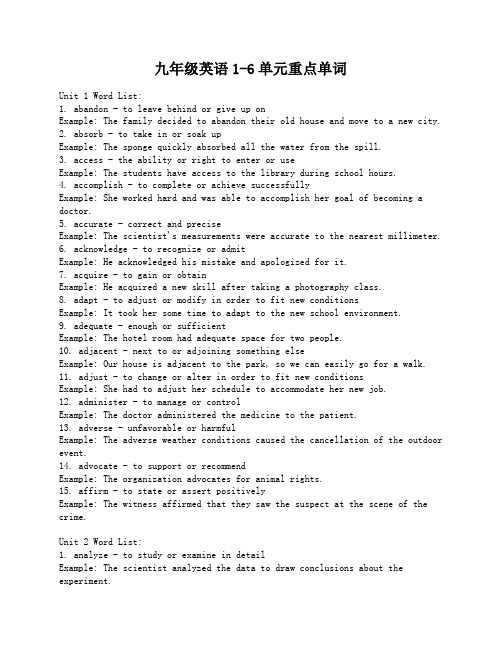
九年级英语1-6单元重点单词Unit 1 Word List:1. abandon - to leave behind or give up onExample: The family decided to abandon their old house and move to a new city.2. absorb - to take in or soak upExample: The sponge quickly absorbed all the water from the spill.3. access - the ability or right to enter or useExample: The students have access to the library during school hours.4. accomplish - to complete or achieve successfullyExample: She worked hard and was able to accomplish her goal of becoming a doctor.5. accurate - correct and preciseExample: The scientist's measurements were accurate to the nearest millimeter.6. acknowledge - to recognize or admitExample: He acknowledged his mistake and apologized for it.7. acquire - to gain or obtainExample: He acquired a new skill after taking a photography class.8. adapt - to adjust or modify in order to fit new conditionsExample: It took her some time to adapt to the new school environment.9. adequate - enough or sufficientExample: The hotel room had adequate space for two people.10. adjacent - next to or adjoining something elseExample: Our house is adjacent to the park, so we can easily go for a walk. 11. adjust - to change or alter in order to fit new conditionsExample: She had to adjust her schedule to accommodate her new job.12. administer - to manage or controlExample: The doctor administered the medicine to the patient.13. adverse - unfavorable or harmfulExample: The adverse weather conditions caused the cancellation of the outdoor event.14. advocate - to support or recommendExample: The organization advocates for animal rights.15. affirm - to state or assert positivelyExample: The witness affirmed that they saw the suspect at the scene of the crime.Unit 2 Word List:1. analyze - to study or examine in detailExample: The scientist analyzed the data to draw conclusions about the experiment.2. anticipate - to expect or predictExample: She anticipated that it would rain, so she brought an umbrella.3. anxious - feeling worried or nervousExample: He felt anxious before taking the important exam.4. appeal - to attract or interestExample: The colorful advertisement appealed to many customers.5. approach - to come near or closer toExample: The hiker approached the summit of the mountain.6. appropriate - suitable or fittingExample: It is important to wear appropriate clothing for a job interview.7. approximate - close to but not exactExample: The approximate cost of the trip is around $500.8. architecture - the art and science of designing buildingsExample: The architect designed a beautiful building that blends with the surrounding landscape.9. argue - to give reasons for or against somethingExample: They often argue about which restaurant to go to for dinner.10. arise - to occur or happenExample: A problem arose when the delivery didn't arrive on time.11. aspect - a particular part or feature of somethingExample: The aspect of her job that she enjoys the most is working with children.12. assess - to evaluate or judgeExample: The teacher will assess the students' understanding through a written test.13. assign - to allocate or designateExample: The teacher assigned each student a different topic for theirresearch project.14. assume - to take for granted or suppose without proofExample: She assumed that her friends would be at the party without confirming it.15. assure - to guarantee or promiseExample: He assured his parents that he would study hard for the upcoming exam.Unit 3 Word List:1. available - able to be used or obtainedExample: There are still some seats available for the concert.2. aware - having knowledge or consciousnessExample: She was not aware that the meeting had been rescheduled.3. barrier - something that blocks or prevents progress or movementExample: The high fence acted as a barrier to keep people out.4. benefit - an advantage or positive outcomeExample: Regular exercise has many benefits for overall health.5. beyond - on or to the further side ofExample: The beach extends beyond the horizon.6. bond - a strong connection or relationshipExample: The family has a strong bond and supports each other.7. brief - short in duration or lengthExample: He gave a brief explanation of the new project.8. capable - having the ability or capacity to do somethingExample: She is a capable leader who can handle difficult situations.9. cautious - careful or hesitant about making decisionsExample: He is cautious when crossing the road to avoid accidents.10. challenge - a difficult task or problemExample: The math problem was a challenge, but he was able to solve it. 11. characteristic - a typical feature or qualityExample: One characteristic of a leopard is its spotted fur.12. clarify - to make clear or understandExample: The teacher clarified the instructions for the assignment.13. collaborate - to work together on a common task or projectExample: The students collaborated to create a group presentation.14. collapse - to fall down or break apart suddenlyExample: The old building collapsed after the earthquake.15. commence - to begin or startExample: The ceremony will commence at 3 PM.Unit 4 Word List:1. commemorate - to honor or remember someone or somethingExample: The monument was built to commemorate the soldiers who died in the war.2. compact - small in size or tightly packedExample: She carries a compact mirror in her purse for quick touch-ups.3. compel - to force or strongly persuadeExample: The evidence compelled the jury to reach a guilty verdict.4. comprehend - to understand or grasp the meaning ofExample: He couldn't comprehend the complex scientific theories.5. comprehensive - complete or including everythingExample: The book provides a comprehensive guide to learning gardening.6. concentrate - to focus one's attention or effortsExample: She needed to concentrate on her studies for the upcoming exam. 7. concern - a matter of interest or importanceExample: The safety of the workers is a major concern for the company.8. conclude - to bring to an end or finishExample: The professor concluded the lecture with a summary of the main points.9. condemn - to express disapproval or strong criticismExample: The community condemned the vandalism of the local park.10. conduct - to carry out or performExample: The scientist conducted experiments to test his hypothesis.11. confess - to admit or acknowledge somethingExample: He confessed that he had taken the money without permission.12. confident - feeling sure of oneself and one's abilitiesExample: The singer was confident before going on stage to perform.13. confront - to face or encounter a challenging or difficult situation Example: She had to confront her fear of public speaking during the presentation.14. consistent - acting or behaving in the same way over timeExample: He has been consistent in his support for environmental conservation.15. constant - happening regularly or frequentlyExample: The noise from the construction site was a constant annoyance.Unit 5 Word List:1. approach - a way of dealing with someone or somethingExample: His approach to solving problems is to break them down into smaller steps.2. appropriate - suitable or fitting for a particular purpose or situation Example: It is important to wear appropriate clothing for a job interview.3. aspect - a particular part or feature of somethingExample: The aspect of her job that she enjoys the most is working with children.4. assemble - to put together or gather in one placeExample: The students were asked to assemble in the auditorium for a special announcement.5. assess - to evaluate or judgeExample: The teacher will assess the students' understanding through a written test.6. associate - to connect or link with something elseExample: He often associates the smell of coffee with mornings.7. assume - to take for granted or suppose without proofExample: She assumed that her friends would be at the party without confirming it.8. assure - to guarantee or promiseExample: He assured his parents that he would study hard for the upcoming exam.9. attach - to fasten or join one thing to anotherExample: Please attach the document to your email before sending it.10. attempt - to make an effort or try to do somethingExample: She attempted to climb the mountain, but had to turn back due to bad weather.11. attitude - a person's feelings or opinions towards something or someone Example: He has a positive attitude towards life and always sees the bright side of things.12. attribute - a quality or characteristic that belongs to someone or somethingExample: Patience is an important attribute for success.13. authorize - to give official permission or approvalExample: The manager authorized the purchase of new equipment.14. avoid - to stay away from or prevent from happeningExample: She tries to avoid sugary foods to maintain a healthy diet.15. aware - having knowledge or consciousness about somethingExample: She was not aware that the meeting had been rescheduled.Unit 6 Word List:1. benefit - an advantage or positive outcomeExample: Regular exercise has many benefits for overall health.2. abandon - to leave behind or give up onExample: The family decided to abandon their old house and move to a new city.3. absorb - to take in or soak upExample: The sponge quickly absorbed all the water from the spill.4. access - the ability or right to enter or useExample: The students have access to the library during school hours.5. accomplish - to complete or achieve successfullyExample: She worked hard and was able to accomplish her goal of becoming a doctor.6. accurate - correct and preciseExample: The scientist's measurements were accurate to the nearest millimeter.7. acknowledge - to recognize or admitExample: He acknowledged his mistake and apologized for it.8. acquire - to gain or obtainExample: He acquired a new skill after taking a photography class.9. adapt - to adjust or modify in order to fit new conditionsExample: It took her some time to adapt to the new school environment.10. adequate - enough or sufficientExample: The hotel room had adequate space for two people.11. adjacent - next to or adjoining something elseExample: Our house is adjacent to the park, so we can easily go for a walk.12. adjust - to change or alter in order to fit new conditionsExample: She had to adjust her schedule to accommodate her new job.13. administer - to manage or controlExample: The doctor administered the medicine to the patient.14. adverse - unfavorable or harmfulExample: The adverse weather conditions caused the cancellation of the outdoor event.15. advocate - to support or recommendExample: The organization advocates for animal rights.。
九年级英语第五单元知识点总结

九年级英语第五单元知识点总结一、重点单词1. belong- 用法:belong to sb. / sth.,表示“属于某人/某物”,无被动语态,也不用于进行时态。
例如:This book belongs to me.(这本书属于我。
)2. picnic- 相关短语:go for a picnic(去野餐);have a picnic(进行野餐)。
例如:We are going for a picnic this weekend.(我们这个周末打算去野餐。
)3. author4. hair band- 词义:发带。
例如:I found a hair band on the playground.(我在操场上发现了一个发带。
)5. possibly- 词性:副词,词义:可能地;也许。
例如:It may possibly rain tomorrow.(明天也许会下雨。
)6. drop- 用法:- 作动词,有“落下;掉下;使落下”等意思。
例如:He dropped his pen on the floor.(他把笔掉在地上了。
)- 还可表示“放弃(想法、计划等)”,例如:He dropped the idea of going abroad.(他放弃了出国的想法。
)- 相关短语:drop by(顺便访问);drop in on sb.(顺便拜访某人);drop off(减少;让……下车)。
7. symphony- 词义:交响乐;交响曲。
例如:Beethoven wrote many famous symphonies.(贝多芬写了许多著名的交响曲。
)8. optometrist- 词义:验光师;配镜师。
例如:You should go to an optometrist to check your eyesight.(你应该去验光师那里检查视力。
)9. appointment- 用法:make an appointment(预约);have an appointment(有约会)。
新版九年级英语1---5单元知识点
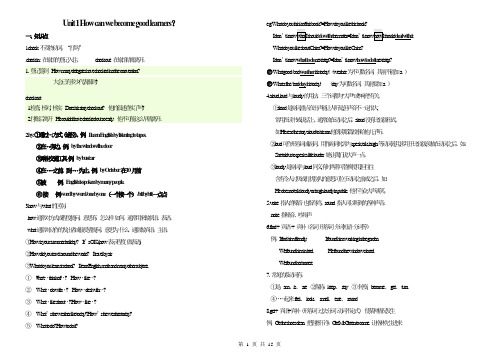
U ni t 1 H o w c an we be c om e g o od l e ar ne rs?一、知识点1.c h e c k不及物动词,“打钩”.c h e c k i n:在旅馆的登记入住。
c h e c k o u t:在旅馆结账离开。
1.登记签到 H o w m a n y d e l e g a t e s h a v e c h e c k e d i n a t t h e c o n v e n t i o n?大会已有多少代表报到?c h e c k o u t1.检查,核对,核实 D o e s h i s s t o r y c h e c k o u t?他的叙述查实了吗?2.付账后离开 H e c o u l d n't h a v e c h e c k e d o u t s o e a r l y.他不可能这么早就离开。
2.b y:①通过….方式(途径)。
例:I l e a r n E n g l i s h b y l i s t e n i n g t o t a p e s.②在….旁边。
例:b y t h e w i n d o w/t h e d o o r③乘坐交通工具例:b y b u s/c a r④在……之前,到……为止。
例:b y O c t o b e r在10月前⑤被例:E n g l i s h i s s p o k e n b y m a n y p e o p l e.⑥接例w o r d b y w o r d/o n e b y o n e(一个接一个) /b i t b y b i t(一点点)3.h o w与w h a t的区别:h o w通常对方式或程度提问,意思有:怎么样如何,通常用来做状语、表语。
w h a t通常对动作的发出者或接受者提问,意思为什么,通常做宾语,主语。
①H o w i s y o u r s u m m e r h o l i d a y? I t’s O K.(h o w表示程度做表语)②H o w d i d y o u t r a v e l a r o u n d t h e w o r l d? I t r a v e l b y a i r.③W h a t d o y o u l e a r n a t s c h o o l? I l e a r n E n g l i s h,m a t h a n d m a n y o t h e r s u b j e c t s.①W h a t…t h i n k o f…? H o w…l i k e…?②W h a t…d o w i t h…? H o w…d e a l w i t h…?③W h a t…l i k e a b o u t…?H o w…l i k e…?④W h a t’s t h e w e a t h e r l i k e t o d a y?H o w’s t h e w e a t h e r t o d a y?⑤W h a t t o d o?H ow t o d o i t?e.g.W h a t d o y o u t h i n k o f t h i s b o o k?=H o w d o y o u l i k e t h i s b o o k?I d o n’t k n o s h o u l d d o w i t h t h e m a t t e r.=I d o n’t k n o s h o u l d d e a l w i t h i t.W h a t d o y o u l i k e a b o u t C h i n a?=H o w d o y o u l i k e C h i n a?I d o n’t k n o w w h a t t o d o n e x t s t e p?=I d o n’t k n o w h o w t o d o i t n e x t s t e p?㊣ W h a t g o o d/b a d w e a t h e r i t i s t o d a y!(w e a t h e r为不可数名词,其前不能加 a)㊣ W h a t a f i n e/b a d d a y i t i s t o d a y!(d a y为可数名词,其前要加 a)4.a l o u d,l o u d与l o u d l y的用法:三个词都与"大声"或"响亮"有关。
2014年秋新目标英语九年级Unit 1-6单元复习总结

2014—2015学年度新目标九年级英语(新版)复习总结Unit 1 How can we become good learners?1.by的用法总结a. 表示方式,方法,手段。
By +交通工具,by + 学习方法b. by+时间到……时为止,不迟于。
注意:by+现在时间为现在完成时标志,by+过去时间为过去完成时标志c.by+地点,表示在什么旁边。
d.by表示经过,如pass by,walk bye.表示根据,如:What’s the time by your watch?f.表示抓着,接触身体的某一部分。
Catch me by the hand.g. 表示一个接一个one by one,word by word2.how及其词组提问的特殊疑问句a. 对交通工具进行提问b. 对学习,生活方式提问c. how often 对频率提问及回答(如twice a week,never,hardly ever等)d. how long对时间段(用for,since等回答)或者物品的长度进行提问e. how soon多久才,用in +时间回答f. how far对路程进行提问,用数词+单位或者时间所有格+walk/bus ride(如5-hour walk = 5 hours’ walk)g. how much对不可数名词或价格提问,how many 对可数名词复数提问h.how many times对次数进行提问3.have a conversation with sb. = communicate with sb.4.pronunciation与pronounce5.discover多表科学探索发现;look for强调动作,寻找;find表结果,偶然发现;find out 表结果,经过调查发现。
6.look up 查字典,look out当心,look up to 钦佩;look down upon看不起;7.注意subject为可数名词,但是学科名词为不可数名词(physics,maths,Chinese)8.take notes;notebook9.be born with;be born in在哪出生;be born to do sth生来做某事10.pay attention to sth/ doing sth11.be active in doing sth/ sth12. connect with 14.P1 1a部分词组,学会问答15.have to do sth.多指客观要求,must do sth多指主观要求16.finish doing sth17.give a report做报道18. before与after均可做介词,其后跟doing19.more than = over,less than,no less than20.sb. spend some time/ some money in doing/ on sth./with sb.It takes sb. Some time to do sthSb. pay some money for sthSth. cost sb. some money21.become +adj./+n.22.the +比较级主+ 谓,the + 比较级主+ 谓表示越。
九年级上册英语1到5单元知识点

九年级上册英语1到5单元知识点总结1. Unit 1: Best friends- Vocabulary: friendship,panion, trust, support- Grammar: present continuous tense, possessive pronouns - Topic: The importance of friendship and how to be a good friend2. Unit 2: English around the world- Vocabulary: bilingual, dialect, accent, globalization- Grammar:parative and superlative adjectives, adverbs of frequency- Topic: The influence of English as a global language and its variations in different countries3. Unit 3: Travel journal- Vocabulary: destination, itinerary, amodation, excursion- Grammar: past simple tense, past continuous tense- Topic: Sharing travel experiences, discussing favorite destinations, and describing past trips4. Unit 4: Great inventions- Vocabulary: innovation, breakthrough, patent, prototype- Grammar: reported speech, passive voice- Topic: Exploring the impact of inventions on society and discussing the process of innovation5. Unit 5: Health and well-being- Vocabulary: nutrition, fitness, well-being, hygiene- Grammar: modal verbs, conditional sentences- Topic: Promoting a healthy lifestyle, discussing the importance of exercise and balanced dietBased on the above knowledge points, it is clear that the ninth-grade English curriculum covers a wide range of topics from interpersonal relationships to globalmunication, from personal experiences to technological advancements, and from physical health to overall well-being. As a language, English not only serves as a means ofmunication but also provides insights into various aspects of life and society.In Unit 1, the focus on friendship highlights the importance of building and maintaining meaningful relationships. The vocabulary related to friendship emphasizes qualities such as trust and support, while the grammar lessons on present continuous tense and possessive pronouns enable students toexpress their thoughts and emotions more accurately. By incorporating these language elements into discussions about friendship, students are able to deepen their understanding of the topic and express themselves more fluently.Moving on to Unit 2, the exploration of English as a global language introduces students to the diversity of language and culture. The vocabulary related to bilingualism and globalization sheds light on the influence of English in different contexts, while the grammar lessons onparative and superlative adjectives provide a framework forparing and contrasting languages. Through discussions on language variations and the impact of globalization, students gain insights into the interconnectedness of the world and the importance of cultural exchange.In Unit 3, the travel journal serves as a platform for students to share their experiences and broaden their perspectives. The vocabulary related to travel and the grammar lessons on past tenses enable students to narrate their past experiences and plan future trips. By engaging in discussions about favorite destinations and travel itineraries, students not only enhance their language skills but also develop a sense of curiosity andadventure.Unit 4 delves into the realm of innovation and invention, offering students a glimpse into the world of creativity and problem-solving. The vocabulary related to innovation and the grammar lessons on reported speech and passive voice provide students with the tools to discuss technological advancements and their impact on society. Through debates on the pros and cons of various inventions, students develop critical thinking skills and an appreciation for human ingenuity.Finally, in Unit 5, the focus on health and well-being encourages students to reflect on their lifestyle choices and habits. The vocabulary related to nutrition and fitness,bined with the grammar lessons on modal verbs and conditional sentences, empowers students to advocate for a healthy lifestyle and express their concerns about public health issues. By engaging in conversations about the importance of exercise and balanced diet, students not only improve their language proficiency but also cultivate a sense of responsibility towards themselves and others.In conclusion, the ninth-grade English curriculum offers a richtapestry of topics that not only enhance language skills but also foster personal growth and broadened perspectives. By incorporating vocabulary, grammar, and topics that are relevant to students' lives, the curriculum provides an engaging and meaningful learning experience.As a writer, I personally find the integration of language learning with real-life topics to be highly effective in stimulating students' interest and fostering a holistic understanding of the English language. Furthermore, the emphasis onmunication skills and critical thinking in the curriculum equips students with the tools to navigate a rapidly changing world, both linguistically and intellectually.In summary, the ninth-grade English curriculum, with its diverse range of topics and language elements, not only prepares students for linguistic proficiency but also nurtures their intellectual curiosity and global awareness. Through the exploration of friendship, globalmunication, travel experiences, technological advancements, and health consciousness, students are not only equipped with language skills but also empowered to navigate theplexities of the modern world. This holistic approach to language learning is essential in nurturingwell-rounded individuals who are capable of engaging with the world in a meaningful and impactful manner.。
Unit 1 单元词汇复习详解-人教版九年级英语全册
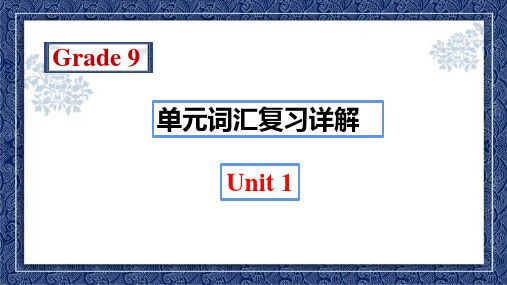
will get.
A. the more careless B.the more careful
C. the harder
D. the worse
4. Just search the Internet and you can get almost all the B you need.
A. message B. information C. picture D. story
Explaination
辨析: connect A with B & connect A to B 1. 用with指把A与B连接在一起,A、B之间不分主次。
Tim connected this(电线) wire with that one. 2. 用to指把A连接在B上,说话者以B为主,为A为辅。
Exercises
根据句意及汉语和首字母提示填写单词 1. The pain in his leg made him cry a loud (大声 地). 2. Dave had a long c onversation (谈话)on the phone with his teacher
yesterday. 3. —Mom, I forgot where I put my t extbook ( 课本) .Could you help me
pronounce n. pronunciation n. 发音;读法 I don't know how to pronounce this word. We should practice pronunciation every morning.
Explaination1. increase vi.
—I learn English D practicing conversations with friends.
人教版九年级英语全册1-5单元短语汇总
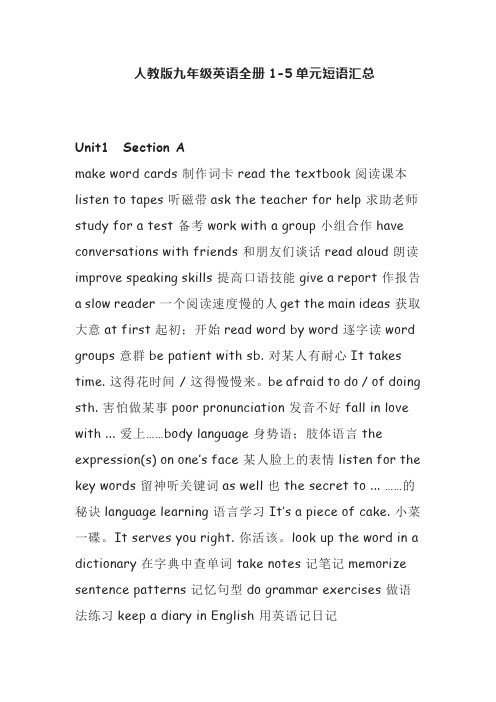
人教版九年级英语全册1-5单元短语汇总Unit1 Section Amake word cards 制作词卡read the textbook 阅读课本listen to tapes 听磁带ask the teacher for help 求助老师study for a test 备考work with a group 小组合作have conversations with friends 和朋友们谈话read aloud 朗读improve speaking skills 提高口语技能give a report 作报告a slow reader 一个阅读速度慢的人get the main ideas 获取大意at first 起初;开始read word by word 逐字读word groups 意群be patient with sb. 对某人有耐心It takes time. 这得花时间 / 这得慢慢来。
be afraid to do / of doing sth. 害怕做某事poor pronunciation 发音不好fall in love with ... 爱上……body language 身势语;肢体语言the expression(s) on one’s face某人脸上的表情listen for the key words 留神听关键词as well 也the secret to ... ……的秘诀language learning 语言学习It’s a piece of cake.小菜一碟。
It serves you right. 你活该。
look up the word in a dictionary 在字典中查单词take notes 记笔记memorize sentence patterns 记忆句型do grammar exercises 做语法练习keep a diary in English 用英语记日记Section Bincrease reading speed 提高阅读速度make mistakes in grammar 在语法方面犯错be born with ... 天生具有……the ability to learn 学习的能力depend on 取决于;依赖learning habits 学习习惯have ... in common 有……共同之处create an interest in ... 对……产生兴趣pay attention to 注意;关注connect ... with ... 把……和……连接或联系起来learn from mistakes 从错误中学习think about 考虑Use it or lose it. 非用即失。
Go - for - it - 九年级英语1~6单元重点复习
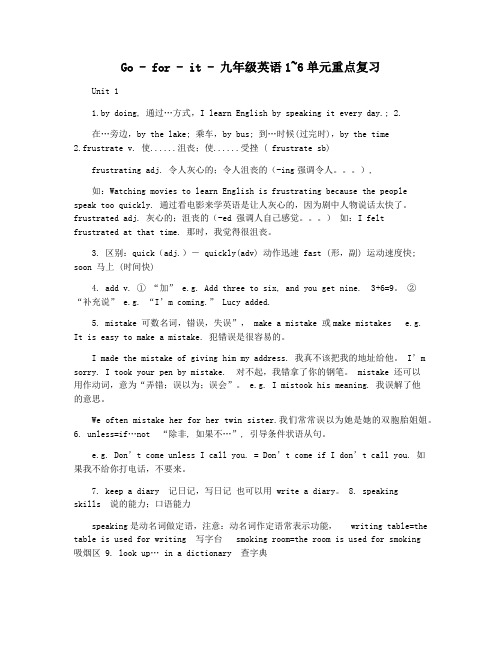
Go - for - it - 九年级英语1~6单元重点复习Unit 11.by doing, 通过…方式,I learn English by speaking it every day.;2.在…旁边,by the lake; 乘车,by bus; 到…时候(过完时),by the time2.frustrate v. 使......沮丧;使......受挫 ( frustrate sb)frustrating adj. 令人灰心的;令人沮丧的(-ing强调令人。
),如:Watching movies to learn English is frustrating because the people speak too quickly. 通过看电影来学英语是让人灰心的,因为剧中人物说话太快了。
frustrated adj. 灰心的;沮丧的(-ed 强调人自己感觉。
)如:I feltfrustrated at that time. 那时,我觉得很沮丧。
3. 区别:quick(adj.)― quickly(adv) 动作迅速 fast (形,副) 运动速度快; soon 马上 (时间快)4. add v. ① “加” e.g. Add three to six, and you get nine. 3+6=9。
② “补充说” e.g. “I’m coming.” Lucy added.5. mistake 可数名词,错误,失误”, make a mistake 或make mistakes e.g.It is easy to make a mistake. 犯错误是很容易的。
I made the mistake of giving him my address. 我真不该把我的地址给他。
I’m sorry. I took your pen by mistake. 对不起,我错拿了你的钢笔。
mistake 还可以用作动词,意为“弄错;误以为;误会”。
人教版九年级英语全册各单元重点知识复习总结
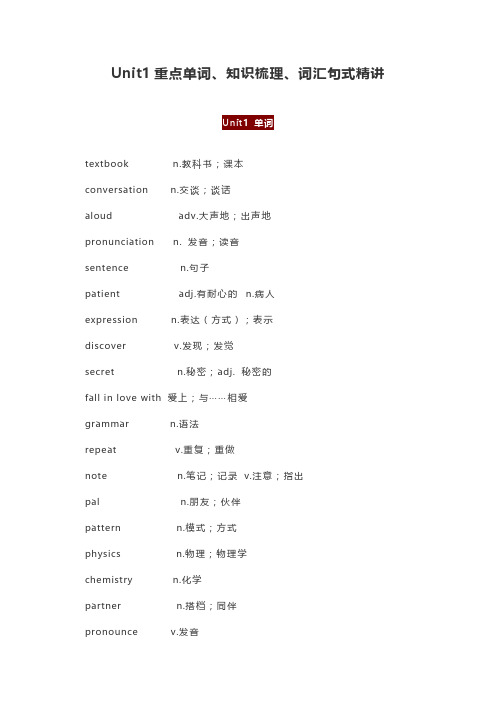
Unit1重点单词、知识梳理、词汇句式精讲textbook n.教科书;课本conversation n.交谈;谈话aloud adv.大声地;出声地pronunciation n. 发音;读音sentence n.句子patient adj.有耐心的 n.病人expression n.表达(方式);表示discover v.发现;发觉secret n.秘密;adj. 秘密的fall in love with 爱上;与⋯⋯相爱grammar n.语法repeat v.重复;重做note n.笔记;记录v.注意;指出pal n.朋友;伙伴pattern n.模式;方式physics n.物理;物理学chemistry n.化学partner n.搭档;同伴pronounce v.发音increase v.增加;增长speed n.速度 v.加速ability n.能力;才能brain n.大脑active adj.活跃的;积极的attention n.注意;关注pay attention to 注意;关注connect v.(使)连接;与⋯⋯有联系connect…with... 把⋯⋯和⋯⋯连接或联系起来overnight adv.一夜之间;在夜间review v.& n.回顾;复习knowledge n.知识;学问wisely adv.明智地;聪明地Annie 安妮(女名)Alexander Graham Bell 格雷厄姆•贝尔Unit 1 How can we become good learners?【重点短语】1. good learners 优秀的学习者2. work with friends 和朋友一起学习3. study for a test 备考4.have conversations with 与……交谈5.speaking skills 口语技巧6.a little 有点儿7.at first 起初起先8.the secret to... .......的秘诀9.because of 因为10.as well 也11.look up 查阅;抬头看12.so that 以便,为了13.the meaning of ……的意思14.make mistakes 犯错误15.talk to 交谈16.depend on 依靠依赖17.in common 共有的18.pay attention to 注意关注19. connect …with …把……联系20.for example 例如21.think about 考虑22.even if 即使尽管纵容23.look for 寻找24.worry about 担心担忧25.make word cards 制作单词卡片26.ask the teacher for help 向老师求助27.read aloud 大声读28.spoken English 英语口语29.give a report 作报告30.word by word 一字一字地31. so……that 如此……以至于32.fall in love with 爱上33.something interesting 有趣的事情34.take notes 记笔记35.how often 多久一次36.a lot of 许多37.the ability to do sth. 做某事的能力38.learning habits 学习习惯39.be interested in 对……感兴趣40.get bored 感到无聊【重点句型】1.提建议的句子:①What/ how about +doing sth.? 做…怎么样?如:What/ How about going shopping?②Why don't you + do sth.? 你为什么不做…?如:Why don't you go shopping?③Why not + do sth. ? 为什么不做…?如:Why not go shopping?④Let's + do sth. 让我们做…吧。
九年级上册英语复习资料

九年级上册英语复习资料九年级英语Unit11. by + doing 通过……方式如:by studying with a groupby 还可以表示:“在…旁”、“靠近”、“在…期间”、“用、”“经过”、“乘车”等如:I live by the river. I have to go back by ten o’clock.The thief entered the room by the window.The student went to park by bus.2. talk about 谈论,议论,讨论如:The students often talk about movie after class. 学生们常常在课后讨论电影。
talk to sb. === talk with sb. 与某人说话3. 提建议的句子:①What/ how about +doing sth.?如:What/ How about going shopping?②Why don’t you + do sth.? 如:Why don’t you go shopping?③Why not + do sth. ? 如:Why not go shopping?④Let’s + do sth. 如:Let’s go shopping⑤Shall we/ I + do sth.? 如:Shall we/ I go shopping?4. a lot 许多常用于句末如:I eat a lot. 我吃了许多。
5. too…to 太…而不能常用的句型too+adj./adv. + to do sth.如:I’m too tired to say anything. 我太累了,什么都不想说。
6. aloud, loud与loudly的用法三个词都与"大声"或"响亮"有关。
①aloud是副词,重点在出声能让人听见,但声音不一定很大,常用在读书或说话上。
2020初中英语人教版九年级全一册 1-5单元 单词 短语 归纳汇总

初中英语人教版九年级全一册1-5单元单词短语归纳汇总九年Unit 1 How can we become good learners?一.必会单词:textbook n.教科书;课本conversation n交谈;谈话aloud adv大声地;出声地pronunciation n.发音;读音sentence n句子patient adj.有耐心的.病人expression n.表情;表示;表达方式discover v.发现;发觉secret n.秘密;秘诀adj.秘密的;保密的grammar n语法repeat v重复;重做note n笔记;记录v注意;指出pal n朋友;伙伴physics n.物理;物理学chemistry n化学memorize v记忆;记住pattern n模式;方式pronounce v,发音increase v增加;增长speed n.速度partner n.搭档:同伴born v出生adj.天生的ability n.能力;才能create v.创造;创建brain n.大脑active adj.活跃的;积极的attention n注意:关注connect v (使)连接;与…有联系overnight adv一夜之间;在夜间review v&n回顾;复习knowledge n.知识;学问lifelong adj终身的;毕生的wisely adv明智地;聪明地二.常考短语:work with friends和朋友一起学习listen to tapes听磁带study for a test备考have conversations with与…交谈/会话speaking skills口语技巧a little有点儿at first起初;起先the secret to...…的秘诀because of因为as well 也instead of代替;而不是take notes记笔记how often多久一次a lot of许多be born with天生具有depend on视……而定;依靠;依赖in common共有的pay attention to注意;关注for example例如think about考虑even if 即使;尽管;纵然look for寻找find out找到;查明look up(在词典、参考书中或通过电脑)查阅,抬头看connect…with..把…和…连接或联系起来make word cards制作单词卡片ask the teacher for help向老师求助watch videos看录像read aloud大声读spoken English英语口语give a report作报告word by word一字一字地;逐字so...that...如此……以至于……fall in love with爱上…something interesting有趣的事情so that以便;为了the meaning of…….的意思make mistakes犯错误talk to交谈,谈话the ability to do sth做某事的能力learning habits学习习惯be interested in对………感兴趣worry about担心;担忧get bored感到无聊/厌烦be good at在……方面擅长be afraid of害怕each other彼此;互相by doing sth.通过做某事What about doing sth?做某事怎么样? finish doing sth完成某事try to do sth尽力做某事;试图做某事find it +adj.+ to do sth发现做某事是…的be afraid to do sth不敢做某事be afraid of doing sth.害怕做某事begin to do sth开始做某事help sb.(to)do sth帮助某人做某事want to do sth想(要)做某事practice doing sth练习做某事need to do sth需要做某事keep doing sth一直做某事remember to do sth记得做某事It +be+ adj.+ to do sth做某事是……的。
人教版初中英语九年级全册-中考英语一轮复习语法知识点

初三全册语法知识点
Grade 9
Unit 1 How can we become good learners?
Verb +bywith gerund动词+by doing sth.动名词,通过…
◉短语动词
不及物动词+副词(其后不加宾语)
breakout爆发come up(计划、建议被)提出fall behind落后
3.一般将来时的被动语态:由“shall/will/be going to/be to be+过去分词”构成。shall用于第一人称,will用于各种人称
6.某些习惯用法中(有些习惯用法常以被动形式出现,强调存在的状态)
被动语态的习惯搭配
be determined to do决心做
be interested in对……感兴趣
be seated...坐好
be dressed in...穿着……
三、被动语态的常用句式
1.普通句式
(1)肯定句式:主语+be+过去分词+其他。
8.过去完成时的被动语态:由“had been+过去分词”构成
二.被动语态的用法
下列情况下通常使用被动语态。
1.不知道动作的执行者或虽然知道动作的执行者但没有必要说出时
2.当强调动作承受者时,常用by引出动作的发出者
3.当动作的执行者是无生命名词时
4.当动作的执行者是泛指或很模糊时
5.出于礼貌不便提及动作执行者时
be+过去分词”既可表示动作,也可表示状态,但“get+过去分词”只能表示动作。
Unit 6 When was it invented?
Passive voice (past tense)被动语态一般过去时
Units1-5重点句子复习考核清单.人教版英语九年级全册

九年级上Unit1Unit5重点句子复习清单I.句子复习单Unit1 How can we bee good learners?1.How can we bee good learners?我们怎样才能成为优秀的学习者?We can bee good learners by asking the teacher for help./by keeping a diary in English/by listening totapes/ by watching English movies and other programs.我们可以通过向老师寻求帮助、用英语写日记、听录音带、看英语电影和其他节目来成为优秀的学习者。
2.Do you have conversations with friends in English?你和朋友们用英语交谈吗?Yes. It really improves my speaking skills./listening/ writing/ reading skills.是的,这真的提高了我的口语、听力、写作和阅读技能中的任意一个。
3.His illness was caused mainly by pressure.他的病主要是由压力引起的。
4.The students walked out of the classroom one by one.学生们一个接一个地走出了教室。
She should improve/increase her reading speed by not reading word by word.她应该通过不一个词一个词地读来提高/增加她的阅读速度。
5.Just read quickly to get the main ideas at first.刚开始时只要快速阅读以了解主要意思即可。
6.Take your time to decide which dress to buy. There is no hurry.慢慢考虑要买哪件衣服。
人教版英语9年级1-5单元知识点总结

Unit 1How can we become good learners?单元知识背记手册◇Section A重点单词1. textbook 教科书;课本2. conversation 交谈;谈话3. aloud 大声地;出声地4. pronunciation 发音;读音5. sentence 句子6. patient 有耐心的;病人7. expression 表情;表示;表达方式8. discover 发现;发觉9. secret 秘密;秘诀;秘密的;保密的10. grammar 语法11. repeat 重复;重做12. note 笔记;记录;注意;指出13. chemistry 化学◇Section A重点短语1. listen to tapes听录音磁带2. have conversations with sb.同某人交谈3. give a report 作报告4. at first 起初;开始5. word by word 逐字逐句地6. be afraid to do sth.害怕做某事7. because of 因为8. fall in love with 爱上9. as well 也10. look up (在词典、参考书中或通过电脑)查阅;抬头看11. take notes记笔记12. keep a diary 记日记◇Section B重点单词1. pronounce 发音2. increase 增加;增长3. speed 速度4. ability 能力;才能5. create 创造;创建6. active 活跃的;积极的7. attention 注意;关注8. connect(使)连接;与……有联系9. review 回顾;复习10. knowledge 知识;学问◇Section B重点短语1. make mistakes 犯错误2. be born with 天生具有3. depend on 取决于;依靠,依赖4. be interested in对……感兴趣5. pay attention to 注意;关注6. connect…with 把……和……连接或联系起来7. think about 考虑8.even if 即使9.write down 写下;记下10.find out 找出;发现;弄清楚11.be stressed out 紧张的;有压力的12.bit by bit 逐渐地;一点点地13.instead of 代替;而不是◇词形变换1.pronounce→(名词)pronunciation2.expression→(动词)express3.discover→(名词)discovery4.memorize→(名词)memory5.wisely→(形容词)wise◇重点句型1.It's too hard to understand spoken English.理解英语口语太难了。
- 1、下载文档前请自行甄别文档内容的完整性,平台不提供额外的编辑、内容补充、找答案等附加服务。
- 2、"仅部分预览"的文档,不可在线预览部分如存在完整性等问题,可反馈申请退款(可完整预览的文档不适用该条件!)。
- 3、如文档侵犯您的权益,请联系客服反馈,我们会尽快为您处理(人工客服工作时间:9:00-18:30)。
Unit11. by doing sth 通过做某事2.it +be+adj+to do sth 做某事是……的3.finish doing sth 完成某事4.what about doing sth?做某事怎么样?5.try to do sth 尽力做某事6.the +比较近,the+比较近越……,就越……7.find it+adj+to do sth 发现做某事8.be afraid of doing sth 害怕做某事9.help sb (to) do sth 帮助某人做某事10.practice doing sth 练习做某事11.keep doing sth 一直做某事12.be afraid to do sth 害怕做某事13.begin to do sth 开始做某事14.want to do sth 想要做某事15.need to do sth 需要做某事16.remember to do sth 记得做某事17.shoot 射(射着,射死等表结果)18.shoot at(瞄准)射1.感叹句式一:What+(a/an)+adj+名词(+主语+谓语+其他)!多么……的……感叹句式二:How +adj/adv+主语+谓语+其他!……多么……!2.in+时间段在……后3.give sb. sth. 给某人某物4.plan to do sth 计划做某事5.refuse to do sth 拒绝做某事6.one of +名词复数形式……之一7.it +is+名词+动词不定式(to do sth)做某事是…8.what …think of…?认为…怎么样?9.make sb do sth 让某人做某事ed to be 过去是……11.warn sb(not)to do sth告诫某人做某事12.tell sb(not)to do sth 告诉某人做某事13.decide to do sth 决定做某事14.promise to do sth 承诺、答应做某事Unit21.not ……· until……直到……猜……You never know until you try something.2.let‘s do sth 咱们做某事吧!3.spend time doing sth 话费时间做某事4.thank sb for doing sth 为做某事而感谢某5.would like to do sth 想要做某事6.look forward to doing sth 盼望做某事7. It seems (that)…It seems a rock band plays there every evening.8. Could you please tell me... ?Could you please tell me how to get to the post office?9.take的用法① take some food take some medicine (=have吃,喝)② take notes做笔记③ take one‘s temperature ( 测量)④ It takes sb some time/money to do something (花费,需要)⑤ I‘ll take this coat.(=buy购买)⑥ take somebody / something to (带领,拿去,取)⑦take a train to Chongqing (乘坐)⑧ take off(脱下)10.turn 的用法turn to page 80 翻到80页It is your turn.轮到你了。
at the turning 在转弯处turn on/ off/ up/ down 关turn right/ left at the first turning /crossingUnit31. have to do sth.不得不做某事don’t have to do sth. = needn’t do sth.= don’t need to do sth. 不必做某事2. go to the movies / go to the cinema/ go to see a film去看电影3. eat breakfast = have breakfast 吃早餐make breakfast / cook breakfast 做早餐4. get a ride 搭车give sb. a ride to sp.让某人搭便车去某地5. work on...从事……;着手开始做……;操作……work out a math problem 算出一道数学题work hard at English = study English hard努力学习英语6. finish doing sth.做完某事7. be angry with sb. = be cross / mad with sb. 对某人生气be angry at / about sth.对某事生气be angry with sb. at sth. 因某事对某人生气get angry with sb. at sth. 因某事对某人生气8. come home from school 放学回家come home from work 下班回家pass away / die与世长辞;去世pass by经过......的旁边pass through 穿过pass the exam通过考试9. borrow sth. from sb.向某人借某物lend sb. sth. = lend sth. to sb. 把某物借给某人10. hate to do sth. = hate doing sth.讨厌做某事11. ask for one’s permission 请求某人的允许12. invite sb. to do sth.邀请某人做某事invite sb. to sp.邀请某人去某地invite sb. to a party邀请某人参加晚会invite sb. to dinner邀请某人吃饭13. have a test = take a test 参加考试give a test举行考试;举行测验pass a test通过考试;测验及格14. go to the store / shop = go shopping 去购物15. don’t have time to do sth.= have no time to do sth.没有时间做某事16. a waste of time / money 浪费时间/ 金钱waste…on…浪费......在......17. let sb. do sth.让某人做某事make sb. do sth.使某人做某事18. spend time or money on sth.在某事上花费时间或金钱spend time (in) doing sth. 某人花时间做某事19. in order to do sth.目的是做某事;为了做某事in order that + 从句为了......Unit4ed to do sth 过去常常做某.2.be afraid of doing sth 害怕做某事3.have to do sth 必须做某事4.make sb do sth 让某人做某事5.give up doing sth 放弃做什么6.try to do sth 尽力做某事7.adj+ enough to do sth 足够…而能够做某事8.be prepared to do sth 准备做某事9.see sb doing sth 看见某人在做某事10.begin to so sth 开始做某事11require sb to do sth 要求某人做某事12.decide to do 决定做某事13.make a decision to do sth 决定做某事14.It‘s hard to believe that …很难相信……15.It +has+been +一段时间+ since+从句自从……以来已经有很多长时间了16.dare to do sth 敢于做某事17.It‘s adj+ for sb+ to do sth对某人来说做某18.take up doing sth 开始做某事Unit51. no matter +what / when / where =whatever / whenever / wherever ―无论什么/什么时候/哪里‖2. it放在find / found 后做形式宾语的用法3. It seems that +从句―好像……‖4.buy sb.sth.=buy sth for sb 给某人买某物5.avoid doing sth 避免做某事6.allow sb to do sth 允许某人做某事7.want to do sth 想做某事8.learn to do sth 学会做某事9.It takes + sb. +一段时间+ to do sth做某事花费某人多长时间10.try to do sth 尽力做某事辨析:be made of 由...制作/制造(材料):在成品中能看出原材料be made from由...制造/制成(材料):在成品中看不出原材料be made in在...制作/制造(产地)Made in China.中国制造例:The desk is made of wood.Bread is made of flour.The paper is made from wood.Wine is made of grapes.This kind of plane is made in China.11. be famous for 以...闻名;为人知晓be known for因...而闻名be famous as作为...而闻名be known as作为...而闻名例:Jingdezhen is famous for china.China is famous for its tourism. Mo Yan is very famous as a writer. 12. allow sb to do sth允许某人做某事allow doing sthbe allowed to do sth例:Please allow me to come in.My boss doesn't allow me to use the telephone. We were not allowed to talk in class. They allowed smoking in this room only.注意:allow只可搭配动名词短语作宾语,不可直接搭用动词不定式作宾补,即只可说allow doing sth,不可说allow to do sth.13.一般现在时的被动语态(见P155页)结构:am/is/are+过去分词。
